Key takeaways:
- A plant-based diet emphasizes foods derived from plants, promoting health benefits like improved heart health, weight management, and reduced risk of chronic diseases.
- Common misconceptions include concerns about protein intake, perceived blandness, and cost; many plant sources offer high protein and diverse flavors while being budget-friendly.
- Meal planning is crucial for a successful transition, allowing for creativity, efficient ingredient use, and healthy decision-making through prepared meals and structured grocery lists.
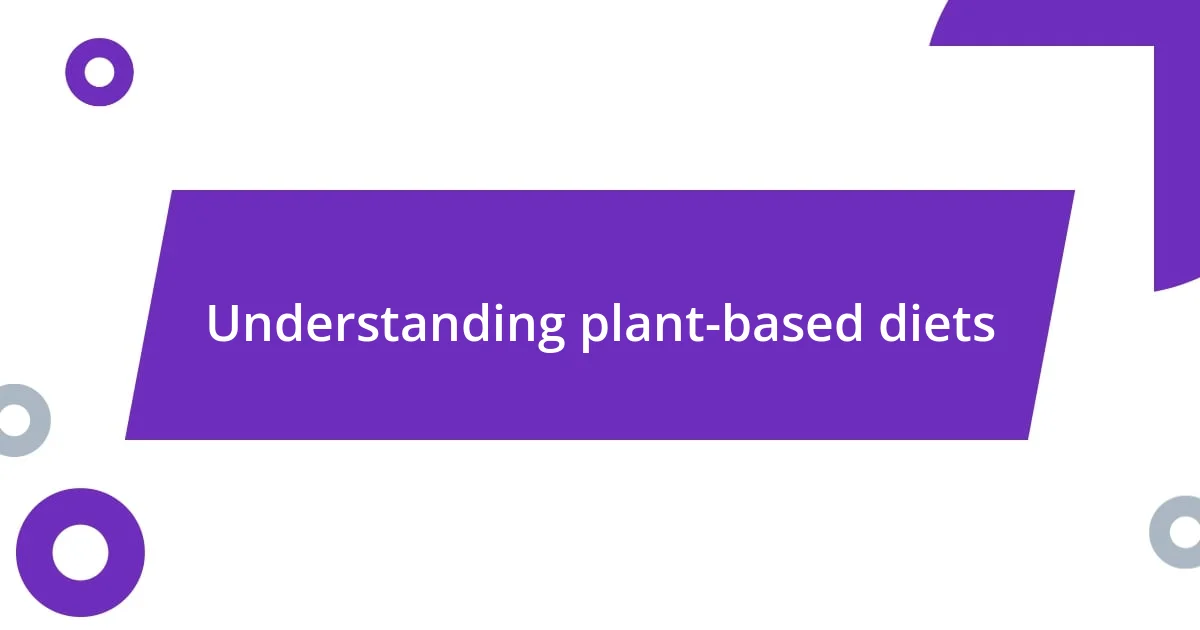
Understanding plant-based diets
A plant-based diet primarily consists of foods derived from plants. This includes not just fruits and vegetables, but also nuts, seeds, oils, whole grains, legumes, and beans. When I first shifted to this kind of diet, I was amazed at how it opened up a whole new world of flavors and textures that I had never fully explored. Have you ever felt that sense of discovery when trying something new?
What I learned was not just about what I was eating, but also why people choose this lifestyle. Many are motivated by health concerns, ethical considerations regarding animal welfare, and environmental impacts. Personally, I found myself reflecting deeply on how my food choices aligned with my values, and it sparked a desire to not only eat better but think more holistically about the planet we inhabit.
It’s fascinating how a plant-based diet can adjust your perspective on nutrition. For me, swapping out meat and dairy meant learning to celebrate vegetables as the stars of my meals rather than just side dishes. Have you ever considered how your meals could change if you stopped viewing certain ingredients as secondary? This mindset shift not only enriched my culinary experiences but also positively impacted my overall well-being.
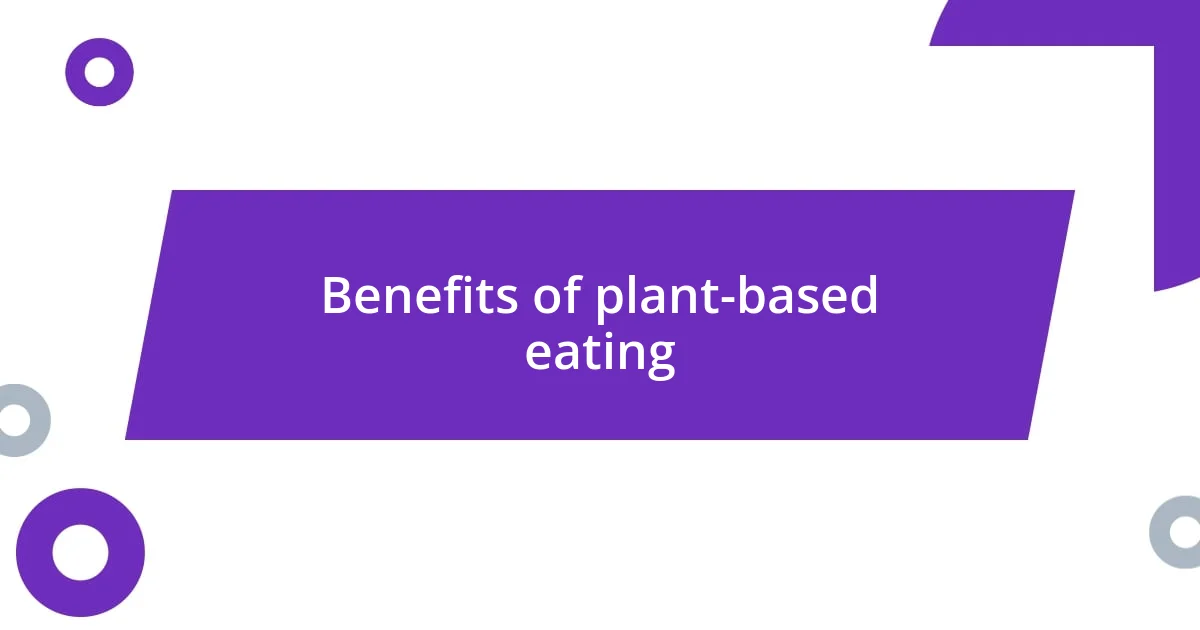
Benefits of plant-based eating
Adopting a plant-based diet offers a plethora of benefits, both physically and mentally. I noticed that my energy levels skyrocketed after making the switch; there was something transformative about fueling my body with nutrient-dense foods. It wasn’t just my physical vitality that improved; my mood lifted, too. I felt lighter, not just from the meals I consumed, but in how I approached my day-to-day life.
Here are some key benefits of plant-based eating:
– Improved Heart Health: Plant-based diets can lower blood pressure and cholesterol levels, reducing the risk of heart disease.
– Weight Management: Many find it easier to maintain a healthy weight due to the higher fiber content in plant foods, which keeps you feeling full longer.
– Lower Risk of Chronic Diseases: Studies suggest that plant-based eating can reduce the risk of diabetes, certain cancers, and other serious health conditions.
– Increased Nutrient Intake: A varied plant-based diet provides a rich array of vitamins, minerals, and antioxidants that promote overall health.
– Sustainable Eating: Less environmental impact supports a healthier planet, which is something that really resonates with me. I’m proud knowing my food choices contribute positively to the environment.
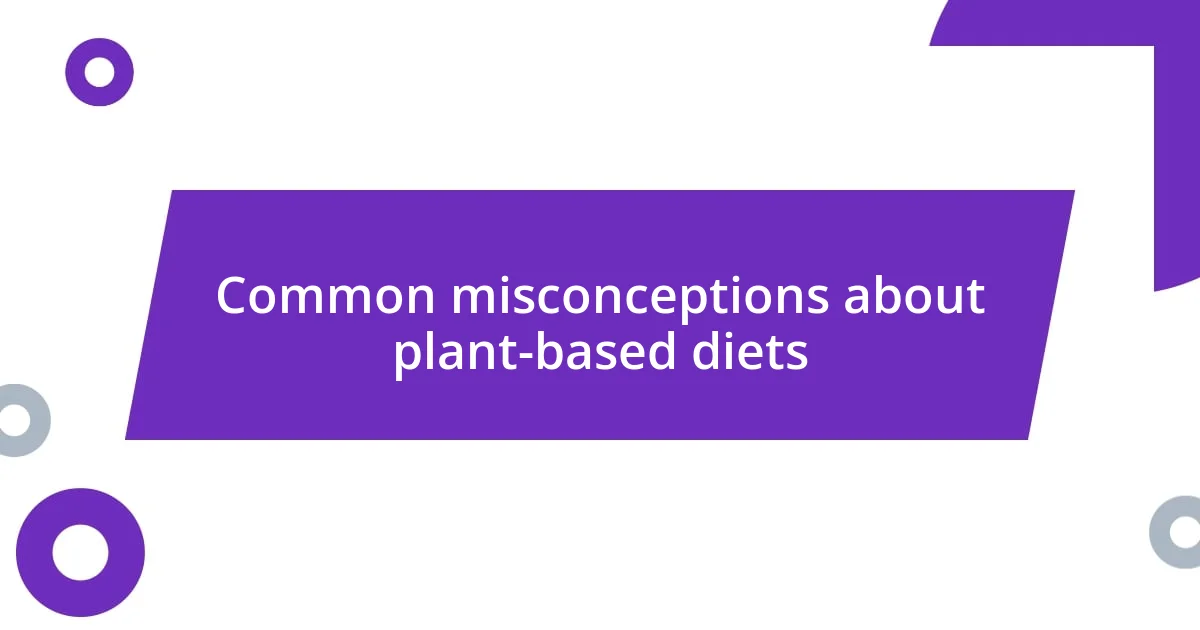
Common misconceptions about plant-based diets
It’s common to hear that plant-based diets lack protein. Personally, I used to worry about meeting my protein needs, particularly when I was an active individual. However, I discovered that there are numerous plant sources packed with protein, such as lentils, chickpeas, and quinoa. In fact, I feel more energized now than I ever did when relying heavily on animal products.
Another misconception I’ve encountered is that plant-based eating is too restrictive or bland. I completely disagree. Since embracing this lifestyle, my meals have become vibrant and flavorful. I consider it an adventure in creativity! The variety of spices, herbs, and cooking methods has transformed traditional dishes into exciting new experiences. Have you ever thought about how many global cuisines highlight plant-based ingredients in their most delicious forms?
Some people think a plant-based diet is expensive, but I’ve learned that it can actually be quite budget-friendly. When I started meal prepping with whole grains and seasonal vegetables, I found that my grocery bills decreased significantly. Being strategic about my choices allowed me to explore affordable yet nutritious options, making it easier to enjoy a sustainable and healthy lifestyle without breaking the bank.
| Misconception | Reality |
|---|---|
| Lacking Protein | Plant foods like lentils and quinoa provide ample protein. |
| Too Restrictive | Plant-based meals can be vibrant and incredibly diverse. |
| Expensive | Seasonal fruits and vegetables can help lower grocery costs. |
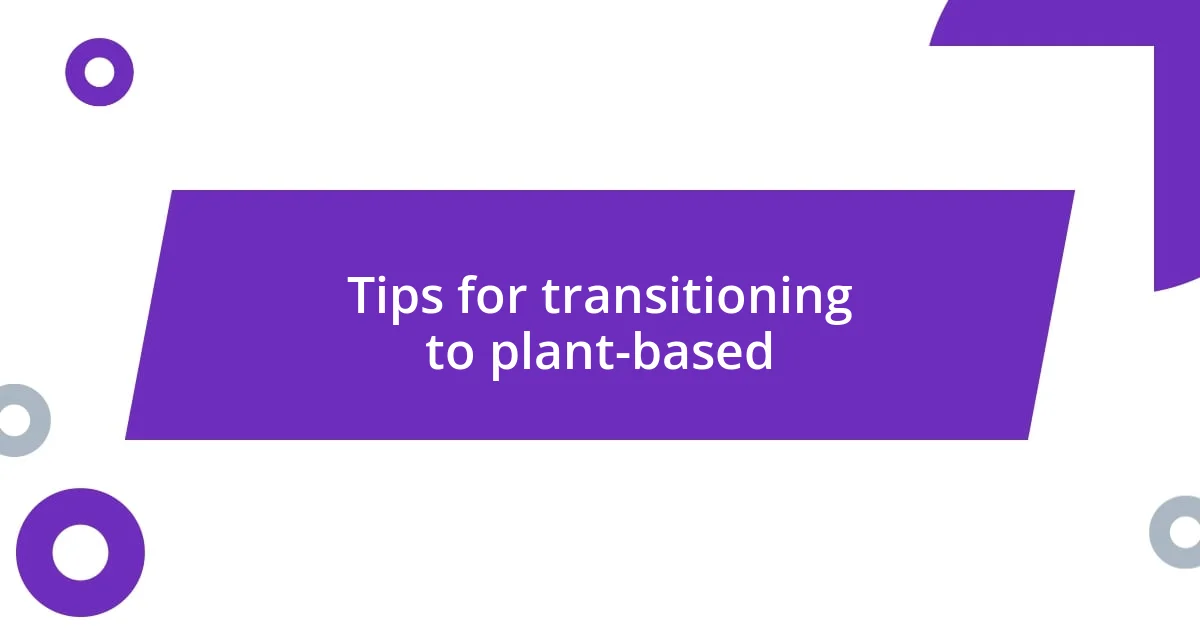
Tips for transitioning to plant-based
Transitioning to a plant-based diet can feel overwhelming at first, but I found that taking small steps made all the difference. For instance, I started by meatless Mondays, and I was surprised at how much I enjoyed exploring new recipes. Have you ever tried a hearty lentil soup? It became one of my go-to meals, showcasing how satisfying plant-based options can be.
Another effective tip is to stock your pantry with versatile staples like beans, nuts, and whole grains. I remember the first time I opened a can of chickpeas; I felt a rush of creativity as I envisioned different dishes. From curries to salads, these ingredients became my culinary foundation, reminding me that plant-based eating can be both simple and delicious.
Lastly, don’t forget about the power of community. I joined an online group where I could share experiences, recipes, and challenges. This support network kept me motivated and gave me fresh ideas to keep my meals exciting. Have you considered reaching out to others on this journey? You’ll be amazed at how much encouragement and inspiration can come from shared experiences.
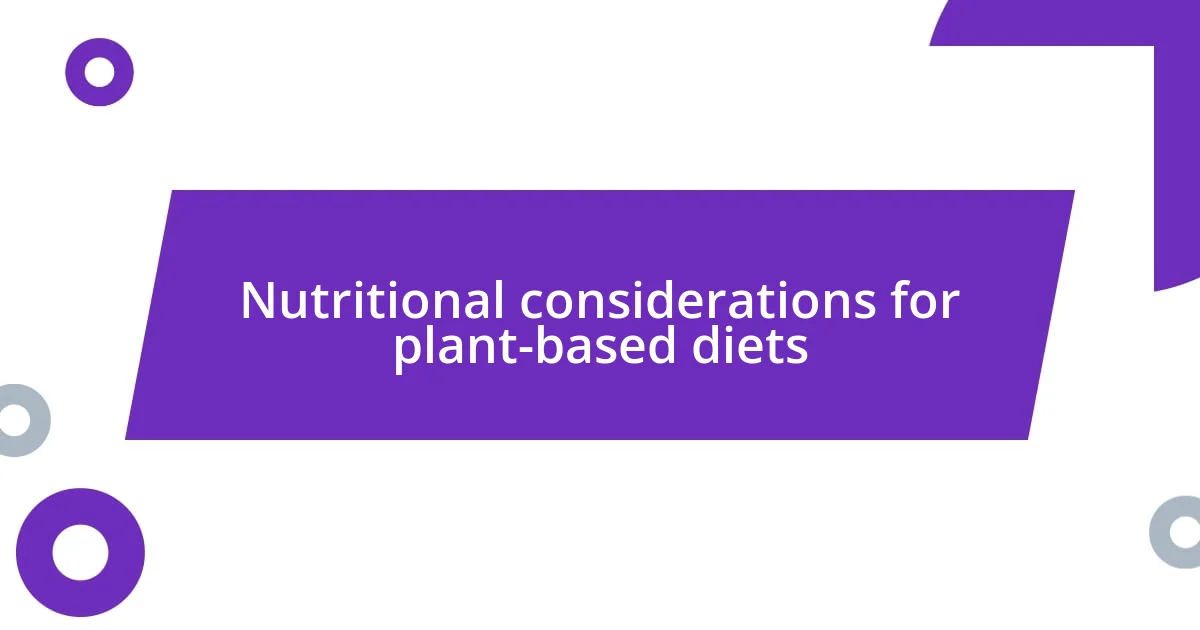
Nutritional considerations for plant-based diets
A key nutritional consideration for anyone adopting a plant-based diet is ensuring adequate intake of essential nutrients. When I first switched to this way of eating, I was a bit overwhelmed by the idea of finding sufficient iron and B12. It turns out that incorporating foods like fortified plant milks and leafy greens, along with occasional supplementation, has worked wonders for my energy levels and overall health. Are you aware of how vital it is to monitor these nutrients when moving away from animal products?
Another point worth mentioning is the importance of omega-3 fatty acids. Initially, I didn’t realize how crucial these were for heart health. I was pleasantly surprised to discover that flaxseeds, chia seeds, and walnuts are great sources. By simply adding these to my smoothies or oatmeal, I felt more balanced and fulfilled. Have you thought about how small changes in your diet can lead to significant health benefits?
Lastly, balancing macronutrients is essential for maintaining energy levels and satiety. I remember days when I’d munch on just fruits and veggies, wondering why I felt unsatisfied. Once I started including healthier fats and whole grains, my meals became much more satisfying. It’s fascinating to see how a simple shift can transform my plate into a well-rounded feast. What’s your favorite way to balance your meals?
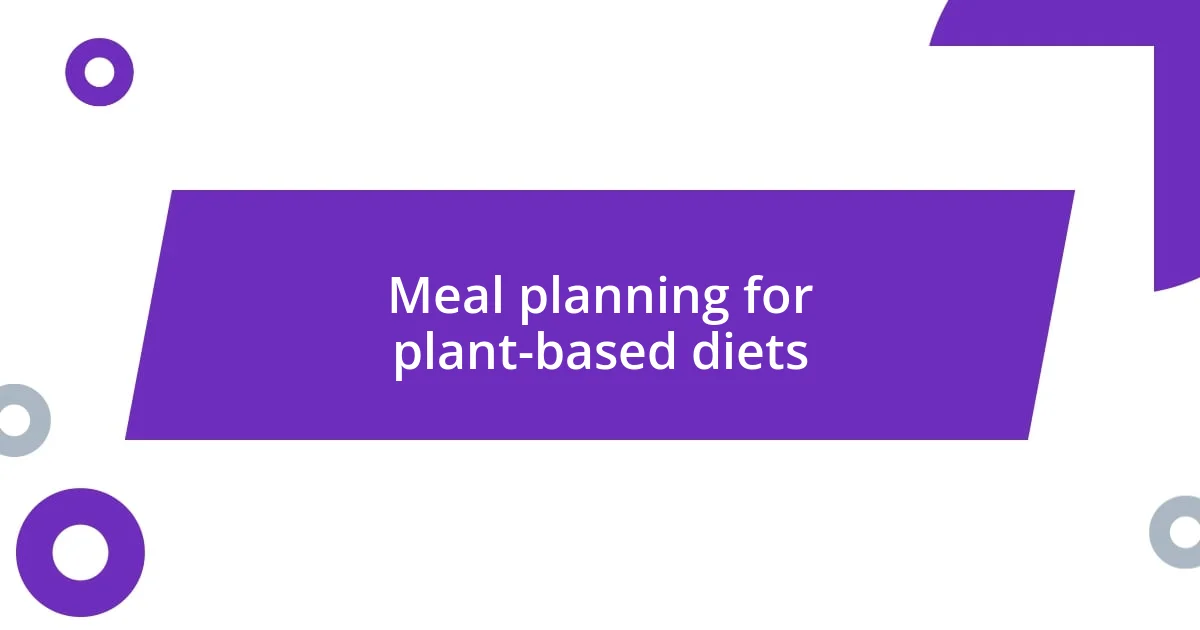
Meal planning for plant-based diets
Meal planning for a plant-based diet can truly be a creative adventure. I often find joy in setting aside a couple of hours each week to prepare meals. This not only saves time during the busy weekdays but also allows me to experiment with different ingredients. Have you noticed how much easier it is to stick with a diet when everything is prepped and ready to go? It’s like giving yourself a delicious gift!
One aspect I love about meal planning is the opportunity to explore grain bowls. I remember my first attempt at building one—layering quinoa, roasted veggies, and a zesty tahini dressing was a revelation. Each bite was a delightful burst of flavors and textures, proving that plant-based eating can be vibrant and satisfying. What’s your go-to combination for a grain bowl? It’s fascinating how the possibilities are endless with just a few staple ingredients.
Don’t forget to make your shopping list as part of your planning routine. I used to shop without a plan and often returned home frustrated with my choices. Now, I thoughtfully select recipes and create a list based on what’s in season and on sale. This not only keeps my budget in check but also ensures that I’m eating fresh and nutritious meals. Have you experienced that thrill of finding a perfect ingredient for a dish you’ve been craving? It’s little moments like that which make meal planning rewarding and fun.














